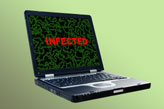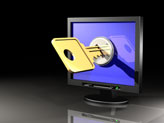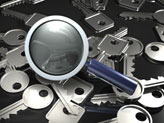Protect Your Computer from Spyware and Adware
Read this article for introductory insight into what Spyware and Adware is, how harmful it can be and most importantly, what steps you can take to protect yourself from it these harmful and annoying programs.
 Fortunately it is quite likely that every household today owns at least one personal computer. Many groups and business organizations own tens, hundreds or even thousands of personal computers. Unfortunately, it is also very likely that you have (or will) experience an adware or spyware infection on your PC which could slow it down, compromise your personal information or even ruin, if not destroy, all of your documents and computer contents. Fortunately it is quite likely that every household today owns at least one personal computer. Many groups and business organizations own tens, hundreds or even thousands of personal computers. Unfortunately, it is also very likely that you have (or will) experience an adware or spyware infection on your PC which could slow it down, compromise your personal information or even ruin, if not destroy, all of your documents and computer contents.
What is adware and spyware?
In general, both spy-ware and ad-ware are pieces of computer software that are usually installed without your knowledge or consent and perform tasks on your computer without your permission or control. These tasks can include the display of advertisements, the collection of your personal information or altering the configuration of your computer. This can be dangerous and damaging, especially if the infected computer contains private and confidential information and records on it.
Adware specifically refers the subset of these programs that automatically display ads on your computer. They may cause pop-up ads, display extra banner advertisements on Web pages you visit, add an advertising toolbar to your browser, etc.
Spyware refers to programs that collect personal information without the user's consent. Typically, this information is automatically sent to the spyware company over the Internet on a periodic basis. They may record the Web sites you visit, keywords you search for, data you enter into forms on Web pages (such as credit card numbers or passwords), everything you type, etc.
A closely related type of computer software is known as malware, which is short for "malicious software" and is sometimes called badware. The main purpose of this software is to infiltrate or damage computers, and it includes all unwanted software such as adware, spyware, tojan horses, worms and viruses. Note that these various terms often overlap, and a single program can be mal-ware, spy-ware and ad-ware.
Clearly, these programs can be very dangerous. To put it simply, imagine what the right kind of information (e.g. passwords, bank account details, credit card numbers, pin codes, etc.) could do if it winds up in the wrong hands. It is extremely unlikely that you would choose not to defend yourself from such dangers, especially when protecting yourself is is relatively easy.
Does my computer have adware or spyware?
Before going into forms of protection and removal, it may be best for you to ask yourself the following questions to give yourself an idea as to whether your computer has already been infected with these malicious programs.
- Does your computer take longer than usual to perform certain tasks?
- Has your computer recently started freezing (also known as "crashing") more frequently?
- When you are browsing the web, have you noticed a new toolbar which you did not opt for and cannot get rid of?
- Do you see more pop up ads and your popup blocker can't stop them?
- Do pop up advertisements come up on your screen even when you are not browsing the Internet?
- Has your browser home page changed without your consent? (Your browser home page is the first page that always comes up when you open your Web browser to search on the Internet).
 If you answered yes to any of the above, it is likely (although not definite) that your computer has been infected with spyware or other unwanted software has been installed. If you answered yes to any of the above, it is likely (although not definite) that your computer has been infected with spyware or other unwanted software has been installed.
How does spyware get onto your computer?
There are numerous ways in which spyware can install itself into your computer without your knowledge or consent. One of the main ways is to install itself while you are installing another program, especially free software. It is especially common in screen savers, file sharing programs and free games. You should also be very careful on song lyrics sites, music download sites, sites offering free smileys, or most other downloads from the Internet unless you are sure you are on a trusted website. Sometimes these programs are mentioned in some manner in the very rarely read fine print of the user agreement of the software you are installing, which is why it is so important to read the full license agreement and terms and conditions of any program that you are downloading and installing on to your computer. However, even that doesn't offer full protection, because sometimes they do not disclose the malware at all, so you need to be extra careful if you download anything from a site you don't completely trust.
Although you don't want spy ware tracking your personal information, you don't necessarily need to be concerned about websites which are programmed to follow your interests. Many of these websites are not dangerous, and do not use your information in any harmful way. For example, you may be a member of an online bookstore website, which may be programmed to check up on what category of books you tend to browse through in order to advise you of special offers and suggested reading from the same book category. This is an example of useful recording of personal information.
How can I protect myself from spyware or remove it if I am already infected?
 In many ways, these programs are an advanced form of technology. They are intelligent and can make it extremely hard for you to uninstall and permanently get rid of them from your computer yourself. Occasionally, when they have changed some of your computer settings, you may know how to manually reset these and think you have corrected things. However, you will likely notice that they just go back into spyware mode each time you restart your computer. You may even have uninstalled the program, only to find that it reappears as soon as you restart your computer. In these cases, you may have to download tools to help you do the job of fully removing these programs. In many ways, these programs are an advanced form of technology. They are intelligent and can make it extremely hard for you to uninstall and permanently get rid of them from your computer yourself. Occasionally, when they have changed some of your computer settings, you may know how to manually reset these and think you have corrected things. However, you will likely notice that they just go back into spyware mode each time you restart your computer. You may even have uninstalled the program, only to find that it reappears as soon as you restart your computer. In these cases, you may have to download tools to help you do the job of fully removing these programs.
There are a number of other ways in which you can protect your computer. These include:
- Using a firewall
- Making sure that your software is kept up to date
- Adjusting your privacy settings in Internet Explorer
- Only downloading from trustworthy sources
- Downloading a free anti-adware or anti-spyware package such as Windows Defender (previously called Microsoft Anti-Spyware), Ad-Aware from Lavasoft or Spybot Search & Destroy
Where can I find anti-spyware and anti-adware software?
 There are many companies offering these products, and some of them are free. You may wish to download a free anti-spyware tool which many companies offer on different websites, or you might decide to buy a low cost anti-spyware package from your ISP (Internet Service Provider) or the maker of your anti-virus software (e.g. McAfee or Norton). These tools will run a scan on your computer to detect spyware and adware programs and settings in your computer and then attempt to remove them for you. Some also attempt to protect you from future infections. You should be able to find a free version of Windows Defender, Ad-Aware, Spybot S&D or other antispyware programs by running a search using your Internet browser. There are many companies offering these products, and some of them are free. You may wish to download a free anti-spyware tool which many companies offer on different websites, or you might decide to buy a low cost anti-spyware package from your ISP (Internet Service Provider) or the maker of your anti-virus software (e.g. McAfee or Norton). These tools will run a scan on your computer to detect spyware and adware programs and settings in your computer and then attempt to remove them for you. Some also attempt to protect you from future infections. You should be able to find a free version of Windows Defender, Ad-Aware, Spybot S&D or other antispyware programs by running a search using your Internet browser.
On a final note, infections can become very annoying and in some cases, like some viruses, may cause your computer's functionality to slow down, make you lose data and documents, or disrupt things enough that your computer doesn't work. As mentioned earlier, it should be in everyone's interests to protect themselves and the information held on their computers from those who are attempting to access it without permission (and even worse, without the user even knowing). Additionally, you may also have seen explicit content on some of the pop-ups these programs generate, and these are not images that we would like our children coming across when innocently surfing the Internet. So don't wait, take a small step to help protect yourself today!
Compare Internet Providers: Dial Up - DSL - Cable - Satellite - Wireless - VOIP
More Articles and Information:
|